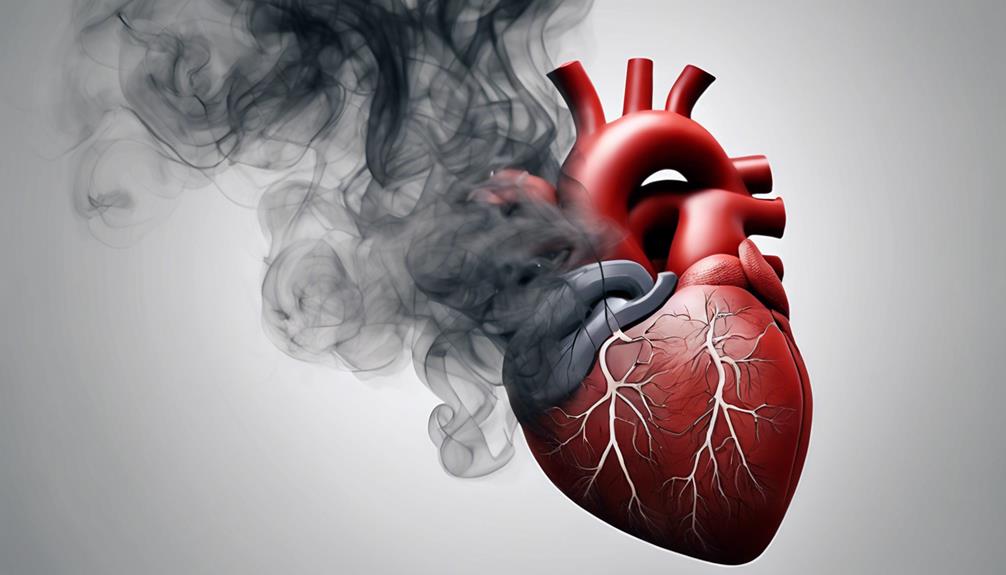When it comes to youSmoking cardiovascular well-being, the connection between smoking and heart health is a topic of significant consideration.
The intricate interplay between smoking and cardiovascular diseases unveils a complex web of consequences that may surprise you.
As you explore the depths of this relationship, prepare to uncover crucial insights that could reshape your perspective on smoking and its impact on your heart.
Table of Contents
Smoking and Cardiovascular Disease Risk

Smoking significantly elevates the risk of various cardiovascular diseases, such as atherosclerosis, coronary heart disease, and stroke, leading to higher rates of fatal and non-fatal cardiovascular events among current smokers. Risk factors for cardiovascular diseases in smokers include the harmful chemicals present in tobacco smoke, which can damage the lining of blood vessels, increase the buildup of fatty plaques in arteries, and raise blood pressure. Additionally, smoking accelerates the heart rate, constricts blood vessels, and reduces the amount of oxygen that reaches the heart, all of which contribute to the development of cardiovascular conditions.
Prevention methods to mitigate the increased risk of cardiovascular diseases due to smoking primarily revolve around smoking cessation. Studies have shown that stopping smoking, particularly before the age of 45, can lead to a significant reduction in the likelihood of developing cardiovascular diseases. By quitting smoking, individuals can reverse some of the damage done to their cardiovascular system, decrease their risk of heart-related events, and improve their overall heart health. Embracing a smoke-free lifestyle is crucial in safeguarding against the detrimental effects of smoking on cardiovascular health.
Related Article: 13 Essential Tips for Avoiding Long-term Smoking Health Risks
Impact of Smoking on Heart Health
The detrimental effects of tobacco smoke on cardiovascular health are profound, with consequences ranging from accelerated plaque formation in blood vessels to elevated blood pressure and increased risks of atherosclerosis and thrombotic events. Smoking significantly impacts heart health by promoting the development of heart disease through mechanisms such as the accumulation of fatty plaques and damage to blood vessels caused by nicotine and carbon monoxide. These effects not only increase the likelihood of atherosclerosis but also elevate the risk of thrombotic events, posing a serious threat to overall cardiovascular well-being.
It’s essential to recognize that exposure to secondhand smoke can also heighten the risk of cardiovascular events, emphasizing the broader impact of smoking on heart health beyond just the individual smoker. Understanding the detrimental effects of smoking on heart health underscores the importance of smoking cessation in reducing the risk of heart disease and improving overall cardiovascular outcomes. Quitting smoking, particularly at a younger age, can lead to significant reductions in the risks associated with various cardiovascular conditions, highlighting the positive impact on heart health.
Mechanisms of Smoking-Related Damage
Damaging blood vessels, cigarette smoke introduces harmful substances like nicotine and carbon monoxide that accelerate the progression of cardiovascular disease. These substances trigger endothelial dysfunction, a condition where the inner lining of blood vessels becomes impaired, leading to reduced vasodilation and increased vascular inflammation.
Endothelial dysfunction sets the stage for atherosclerosis, the buildup of plaque within arteries, which narrows the vessels and restricts blood flow. Furthermore, the presence of nicotine in cigarette smoke not only affects endothelial function but also contributes to vascular inflammation, creating an environment prone to clot formation and thrombotic events.
Smokers face an elevated risk of developing these complications due to the direct impact of smoking on blood vessels throughout the body. Understanding these mechanisms highlights the intricate ways in which smoking damages cardiovascular health and underscores the critical importance of smoking cessation in mitigating these detrimental effects.
Smoking and Blood Vessels
Accelerating the accumulation of fatty plaque and increasing the risk of thrombotic events, cigarette smoking damages blood vessels by impairing vasoreactivity and inducing morphologic abnormalities in the endothelium. Nicotine and carbon monoxide in cigarette smoke have toxic effects on the endothelium, leading to vascular dysfunction.
The effects on the endothelium can result in reduced nitric oxide bioavailability, increased inflammation, and enhanced oxidative stress, all of which contribute to vascular damage. These alterations in endothelial function have significant implications for overall vascular health, as they can lead to atherosclerosis, hypertension, and other cardiovascular diseases.
The morphologic abnormalities induced by smoking further exacerbate the compromised vascular function, creating an environment conducive to the development of cardiovascular issues. Understanding the detrimental effects of smoking on the endothelium and vascular function is crucial in emphasizing the importance of smoking cessation to mitigate the risk of cardiovascular diseases associated with vascular damage.
Latest Research on Smoking and Cardiovascular Health
Research findings on smoking and its impact on cardiovascular health continue to provide crucial insights into the risks associated with even minimal cigarette consumption. Recent studies have highlighted that smoking just one cigarette per day significantly increases the risk of coronary heart disease and stroke.
Interestingly, women who smoke at this minimal level still face 31% of the excess risk observed in heavy smokers consuming 20 cigarettes daily, with a particular emphasis on the elevated relative risks for stroke compared to men. Moreover, reducing smoking habits may not uniformly decrease the risk of coronary heart disease, but heavy smokers who manage to cut down experience a notable decrease in lung cancer risk.
When analyzing the adjusted relative risks for smoking 1 versus 20 cigarettes per day, studies considering multiple confounders reveal higher risks, especially for women. These findings underscore the critical role of smoking cessation in addressing risk factors for cardiovascular diseases and emphasize the importance of public health initiatives to combat the detrimental effects of even light smoking habits.
Dangers of Smoking for the Heart
Smoking poses a significant threat to heart health by increasing the risk of atherosclerotic cardiovascular disease through the accumulation of fatty plaques in blood vessels. Tobacco use significantly elevates the chances of developing heart disease by damaging blood vessels with components like nicotine and carbon monoxide found in cigarette smoke. These harmful substances not only contribute to the formation of fatty deposits in arteries but also raise the likelihood of thrombotic events and negatively impact peripheral blood vessels.
Individuals who smoke face heightened risks of various cardiovascular conditions, including atherosclerosis, coronary heart disease, and stroke, due to the detrimental effects of tobacco. It’s crucial to recognize the dangers associated with smoking for heart health and understand that quitting smoking can lead to improved outcomes for those with a history of stroke and reduce major adverse cardiac events in individuals undergoing cardiovascular procedures.
Additionally, exposure to secondhand smoke also plays a role in increasing the risk of cardiovascular events, underscoring the importance of creating smoke-free environments to safeguard heart health.
Smoking Cessation Strategies
Effective smoking cessation strategies employ various interventions and medications to support individuals in their journey towards quitting tobacco use. Behavioral interventions, such as counseling and support groups, play a vital role in addressing the psychological aspects of addiction.
Additionally, pharmacotherapy options like nicotine replacement therapy, bupropion, and varenicline have demonstrated efficacy in aiding smoking cessation. Notably, varenicline has shown higher success rates compared to other methods, making it a valuable tool in helping individuals overcome nicotine dependence.
Clinical guidelines stress the importance of smoking cessation in reducing cardiovascular mortality and risks. However, only a small percentage of these guidelines provide detailed information on the steps individuals can take to quit smoking successfully.
Therefore, implementing comprehensive tobacco control programs that incorporate evidence-based strategies is essential for decreasing smoking prevalence and fostering successful cessation outcomes. By utilizing a combination of behavioral interventions and pharmacotherapy options, individuals can enhance their chances of breaking free from tobacco addiction and improving their cardiovascular health.
Empowering Health Decisions
To make informed and impactful health decisions, individuals must understand the critical link between smoking behavior and cardiovascular health outcomes. Health education plays a crucial role in empowering individuals to make lifestyle changes that can positively impact their cardiovascular health. By educating oneself about the risks associated with smoking and cardiovascular diseases, individuals are better equipped to make decisions that align with their long-term health goals.
Implementing lifestyle changes, such as quitting smoking and adopting a healthier routine, can significantly reduce the risk of cardiovascular events. It’s essential to recognize that quitting smoking, especially at a younger age, can have profound benefits on cardiovascular health outcomes. Hospitalization due to cardiovascular issues can serve as a pivotal moment for individuals to reevaluate their smoking habits and commit to smoking cessation efforts.
Physician advice and interventions in healthcare settings are instrumental in supporting individuals on their journey towards quitting smoking. By actively engaging with healthcare professionals and utilizing available resources, individuals can enhance their chances of successfully quitting smoking and improving their cardiovascular health outcomes. Remember, informed decisions today can lead to a healthier tomorrow.
Frequently Asked Questions
How Does Smoking Affect Cardiovascular Health?
Smoking negatively impacts cardiovascular health by raising blood pressure, cholesterol levels, and causing inflammation. It impairs lung function and accelerates atherosclerosis. Quitting smoking reduces these risks and improves heart health, leading to better outcomes and decreased risks.
Is There a Scientific Correlation Between Smoking and Cardiovascular Disease?
You must acknowledge the clear scientific correlation between smoking and cardiovascular disease. Various risk factors highlighted in epidemiological studies and statistics confirm this link. Prevention strategies are crucial in reducing the impact of smoking on heart health.
What Are the 5 Circulatory Diseases Caused by Smoking?
When you smoke, you increase your chances of developing atherosclerosis, coronary heart disease, peripheral artery disease, abdominal aortic aneurysms, and cerebrovascular disease. Quitting smoking reduces these risks, improving your cardiovascular health and overall well-being.
What Is the Correlation Between Smoking and Health Problems?
When you smoke, your lung function decreases, and your cancer risk skyrockets. These health problems are directly correlated with smoking. Quitting can reverse some damage, improving lung health and decreasing cancer risk.



